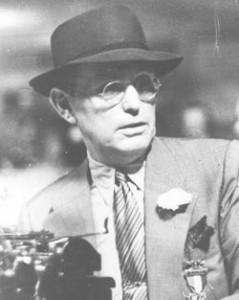 The power of a nice soundbite … The title of this site is based on a quotation that I, personally, find a very evocative expression of the risk in business problem. I was reminded of another elegant problem framer whilst getting stuck into Antifragile, Nassim Nicholas Taleb’s final volume of his trilogy on risk. This, like the others, contains plenty of food for thought for the organisational risk manager and will be the subject of a lengthy review here in due course.
The power of a nice soundbite … The title of this site is based on a quotation that I, personally, find a very evocative expression of the risk in business problem. I was reminded of another elegant problem framer whilst getting stuck into Antifragile, Nassim Nicholas Taleb’s final volume of his trilogy on risk. This, like the others, contains plenty of food for thought for the organisational risk manager and will be the subject of a lengthy review here in due course.
NNT is famously scornful of traditional approaches to risk and focusses on the high consequence event which is hard to foresee. But I was a bit surprised to find him accept, rather grudgingly, that there they can be quite useful for the more mundane, higher probability events which play out in predictable ways. I’m not convinced. When I did my book on Estimating Risk my publisher recommended that if I ever did a reading (I’m still dreaming) I should use my rant about the futility of trying for accuracy in risk management. There’s no such thing as an objective probability and, if pushed, I would probably say that any situation where there’s enough data to make a credible prediction of the likelihood of something going wrong is not risk at all, just routine operations. This probably lines up with the operational risk management concept beloved of the financial sector.
Take reliability. This is the ultimate data-driven risk world. It’s easy enough to put together a circuit diagram, or other system model, apply some criteria for system success/failure and work out the probabilities based on the characteristics of the components. Each individual component has well-documented failure characteristics; in fact you can look them up in standards. So accurate system reliability analysis is straightforward in principle and ‘accurate’. Or so I thought until the company I worked for bought British Rail Research following the UK rail privatisation. BRR was a hive of barely-commercial intellectual activity and unsurprisingly had a major interest in the reliability of the kit and the integrated system it supported. And the main guy was uncompromisingly opposed to the neat picture I’ve just described. It just didn’t work for him in real life. Perhaps we’ll come back to the details another day if I can dig them out.
So for what it’s worth, I think risk management only becomes interesting and worthwhile when the past is a poor guide to the future and luckily (for me) this is almost always the case, much more than people lazily suppose.
Which brings me to Damon Runyon, via my father who was in the RAF in the war and was trained in the US and Canada. He was introduced in the early 1940s to Runyon’s cast of lovable, Broadway-based chancers and semi-mafiosi who eventually made it to the more saccharine musical, Guys and Dolls. Runyon is pretty much forgotten nowadays and the adjective runyonesque has fallen out of use, mainly because lovable and mafiosi is no longer seen as an appropriate combination. Indeed Runyon’s ironic, deadpan style is what made his descriptions of often fairly nasty events so laugh out loud hilarious, as both father and son found. Runyon gave his short stories pace and immediacy by using only the present tense, a device since adopted by tedious TV historians who seem to think that we will take more interest in the past if we think it isn’t.
Anyway, Runyon’s characters occasionally travelled away from Broadway and on one occasion made it up North to the Ivy League. The event was a boat race, Harvard vs Yale maybe, and Harry the Horse, the trackside hustler character comes to life when he hears that he can get odds on one boat of 3 to 1 against, “nothing between men is 3 to 1.” What he means is that the vicissitudes of life in general, and the capricious behaviour of people in particular, mean that, no matter how much better on paper one boat is than another, 3 to 1 is well worth a flutter.
Harry the Horse is reminiscent of NNT’s character Fat Tony, a wheeling-dealing everyman whose success is based on observations of life. Fat Tony, of Brooklyn, is contrasted with the Manhattan bankers who live by the fragile theories of Nobel-winning, economist scumbags (not my words, of course) and have destroyed us all. (No consistency on Clouds of Vagueness, last week it was accountants.)
I have no memory of how this played out and whether Harry cleaned up or not (probably not). But idea that nothing between men is 3 to one lives on strongly in my mind and sometimes I have to force myself to remember that not all my colleagues and clients benefit from the collective wisdom of Harry the Horse, Fat Tony and the rest, nor my father’s sense of humour.

